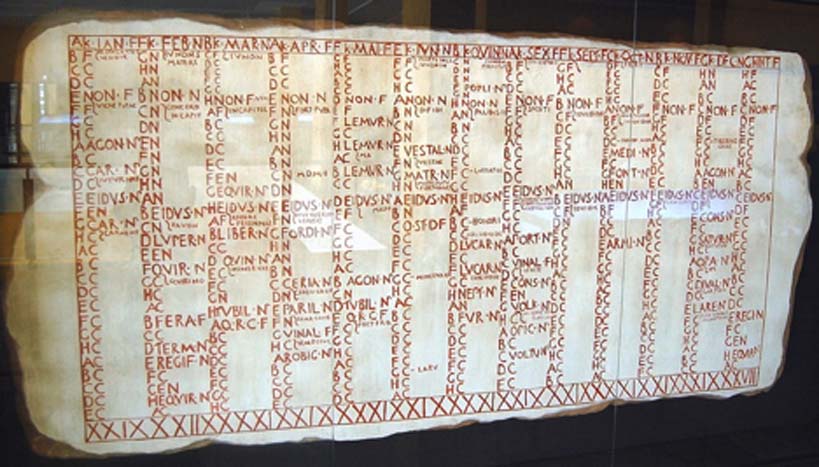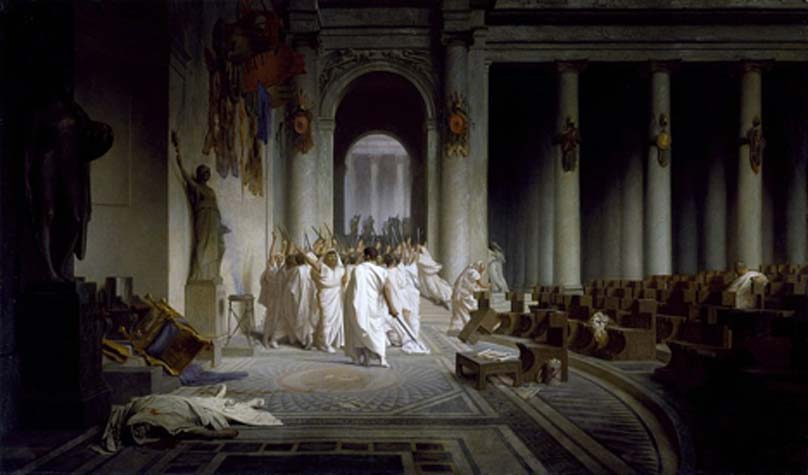
The Ides of March, Celebration of Roman Goddess Anna Perenna
The assassination of Julius Caesar on the 15th of March 44 BC was a turning point in Roman history. Centuries later, the expression ‘Beware the Ides of March’ was found in Shakespeare's Julius Caesar in 1601 in the soothsayer's message to Julius Caesar, warning of his death. Since then, the Ides of March became notorious as being associated with death. However, long before the Ides of March became associated with Julius Caesar’s murder, it was a day of celebration for the ancient goddess Anna Perenna, a goddess beloved by the common people.

Reproduction of the Fasti Antiates Maiores or Roman Calendar (Bauglir /CC BY-SA 4.0)
The Ides of March: Festival on Via Flaminia
Anna Perenna’s two names both refer to the year: anna meaning ‘to live through a year’, while perenna means ‘last many years’ - the two words are still seen in the English words annual and perennial. As her concern seems to be cycles of renewal and connecting the past to the present, the festival of Anna Perenna was full of contradictions such as old and new as well as death and rebirth. The month of March itself was believed to be the first month of the year. It was a time when springtime was in full bloom and newness was all around. Therefore, the celebration would have marked the first full moon in the year in the old lunar Roman calendar.

The Death of Caesar by Jean-Léon Gérôme (1859 to 1867) (Public Domain)
On the evening of the 15th of March, people would camp out at the first milestone on the Via Flaminia, Anna Perenna’s sacred grove of fruit trees by the banks of the Tiber. This same sacred grove was also famous for its tombs and cemeteries. The people would picnic merrily into the night. They would feast, dance, sing and celebrate with wine, toasting to health and long life. In Saturnalia 1.12.6, Macrobius related that public and private offerings were made to Anna Perenna ut annare perannareque commode liccat (‘that the circle of the year may be completed happily’). As it was believed that one would live as many years as the cups of wine one could drink, it was of course traditional to get extremely drunk. Ovid goes further and dramatically describes the festival as the people celebrating this ancient goddess with sexual and verbal freedom. Therefore, through her festival, Anna Perenna gave a sacred space for free and uninhibited speech.

Statue commemorating Ovid's exile in Tomis by Ettore Ferrari (1887) (CC BY-SA 3.0)
Anna Perenna, Sister of Dido of Carthage, Fleeing to Aeneas
In Fausti, Ovid reports a Roman legend that identifies Anna Perenna as the sister of Dido, the Carthaginian founder in Virgil's Aeneid. To escape their brother Pygmalion after the death of Dido, Anna led a group of refugees to find refuge in the home of Battus, the king of Malta. After protecting them for three years, Battus counselled Anna to flee and find a new place of exile for her own safety and those of her people as her brother was seeking war against Malta to bring her back to Carthage. Once again forced to flee over the seas, Anna and her people were shipwrecked on the coasts of Latium where they were then saved and hosted in Aeneas' settlement of Lavinium. However, Anna's presence there made Lavinia, wife of Aeneas, increasingly jealous. One night, Dido appeared in Anna's dream to persuade her to abandon her latest refuge. Anna again gathered her refugees and took her leave. Anna was swept away by the river Numicus. She morphed into a river nymph hidden in the amnis perennis (perennial stream), and was renamed Anna Perenna.




